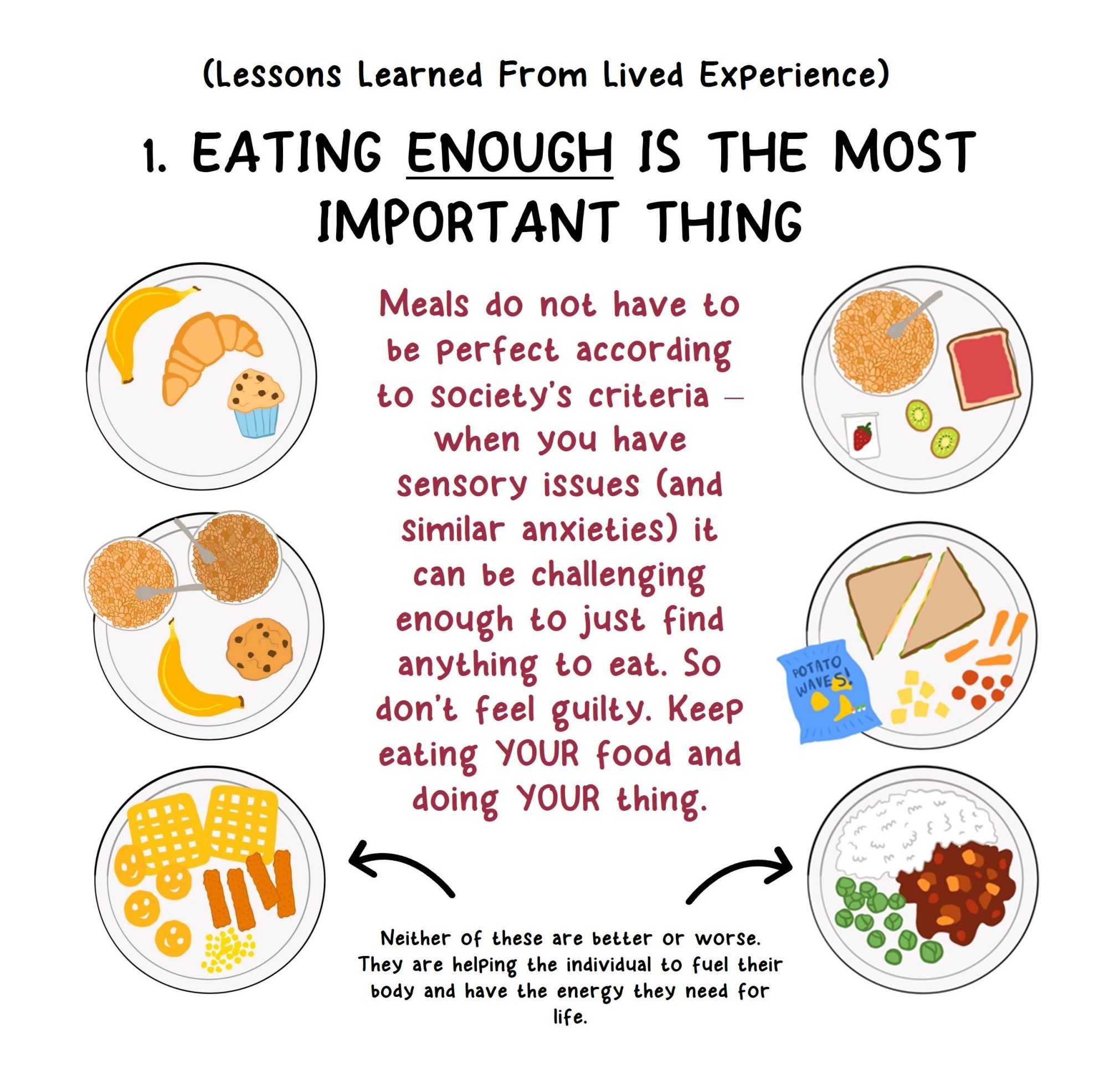(Lessons Learned From Lived Experience 1. Eating Enough Is The Most Important Thing)
I was speaking to a friend recently, trying to offer some advice for when struggling to eat because of difficulties finding foods that feel okay to eat from a sensory perspective. It reminded me of one of the most important pieces of advice I tend to give parents who ask me about what to do if their autistic child is a very ‘fussy eater’ to ensure they’re getting a good diet.
The advice, you ask?
Quite simply it’s ‘make sure they eat enough’. That’s the most important thing.
I have a saying to myself ‘the body is magical. Trust in it’ because I have learnt through years of experience that our bodies are incredibly resilient and adaptable. They do so much work to keep us running without us even having to ask them. Your body regulates it’s temperature, your blood sugars, and it’ll even do clever things like turn fat to carbs or carbs to fat, if your energy levels dictate it. Your body wants you to feel good and will fight to keep itself, aka you, well. If you eat a lot one day, it’ll try to burn off that extra energy (hence why we don’t gain weight from one random day of indulging) and if you’re not eating enough and you lose a lot of weight, it’ll grow hair (lanugo) to try and preserve itself, and spend less energy on heat!
In the same way, our bodies will adapt if our diets aren’t super varied. There are cases where individuals have spent years only eating two or three different foods while remaining functional, and that’s because their bodies adapted to take care of them. It’s important, yes, to try and have some fruit and veg, and a little protein, but in my opinion we have all become too obsessed with health and achieving particular macros; we have become too concerned about being perfect, even down to our diets. And this creates problems if you are someone, or if you have a child, who can’t manage a wide variety of foods.
When I was young I wouldn’t eat…most things! There were 3 fruits and 3 vegetables I’d eat, and only in very specific forms (e.g. I’d have two tablespoons of raisins in hot milk at night, but in no other way, and I’d alternate between 2 tablespoons sweetcorn or 3 sprouts of broccoli with 9 slices of boiled carrot as my dinner vegetable), and I couldn’t deal with potatoes, rice, pasta, nuts, cheese (and that was in all forms, be it pizza, on pasta, etc), yogurt, sandwiches, meat, fish unless it came as fishfingers or was breaded, chocolate…I lived on a lot of cereal and yellow foods! For lunch I’d rely on butter and bread and plain biscuits and plain cake, and my dinners were things like fishfingers and then either potato waffles or a bowl of cereal, and for snacks I’d go through several lunchbox style mini packs of treats (providing there was no chocolate!)! This might sound like a terrible diet – I had one to two fruits a day, a teeny bit of veg, and a lot of carbs and processed snack treats, but you know what? I was the healthiest I’ve ever, ever been.
Between the ages of 9 and 13 I saw an outpatient team at CAMHS, having been diagnosed with anorexia at 9. Although I was very underweight when they first saw me, within a year I had restored my weight fully, and by following a simple meal plan I was able to remain this way for 4 years. And it was one of the best periods of my life. I had energy, I was able to throw myself into all my hobbies and interests, I didn’t worry too much about food – yes I was ‘fussy’, and I did follow this plan, but I could still eat out (at places that served fish fingers, or omelettes), and go on holiday, and most of all my physical health was just..not a consideration! I also had beautiful thick hair, lovely skin, and my mum often describes me as being ‘the picture of health’.
And true, I could’ve eaten ‘healthier’ maybe, by the standards our society have determined. But there was no need, and my sensory issues needed accomodating in order for me TO eat. It was the official dietitian who came up with this meal plan, based on my peculiarities around food, so yes, it was approved, and she emphasised the same thing as I am doing now: the most important thing is to eat enough.
I’ve gone on a bit, I know! Sorry. But if you are an individual struggling to maintain a good weight because of sensory issues and trying to eat a good diet – please, just eat enough. Eat your safe foods over and over. If you like plain bread, or cookies, or sausage rolls, and if the only fruits you can eat are bananas and apples, go for it. Just eat those. Just eat ENOUGH. Please.
Also – the same goes if you are a parent. Forget the ridiculous school lunchbox guidelines and the ‘eatwell’ plate. Give your child whatever they will eat if it means they keep on eating. And don’t feel guilty for this. Food literally is fuel and if it comes in the form of cake and strawberry milkshake, so be it! YOU ARE NOT A BAD PARENT FOR ACCOMODATING YOUR CHILDS NEEDS, AND FEEDING THEM.
(I just want to add that I now eat everything – except raw onions, salad dressing, butter, and mayonnaise! I still struggle with sensory issues, but I adore all salad vegetables, broccoli, brussels, blue cheese, LOTS of sandwiches, pasta, couscous, tagine, rice dishes, jacket potatoes, etc. Things DO get better, and sensory difficulties and experiences do change over time!)

Leave a Reply